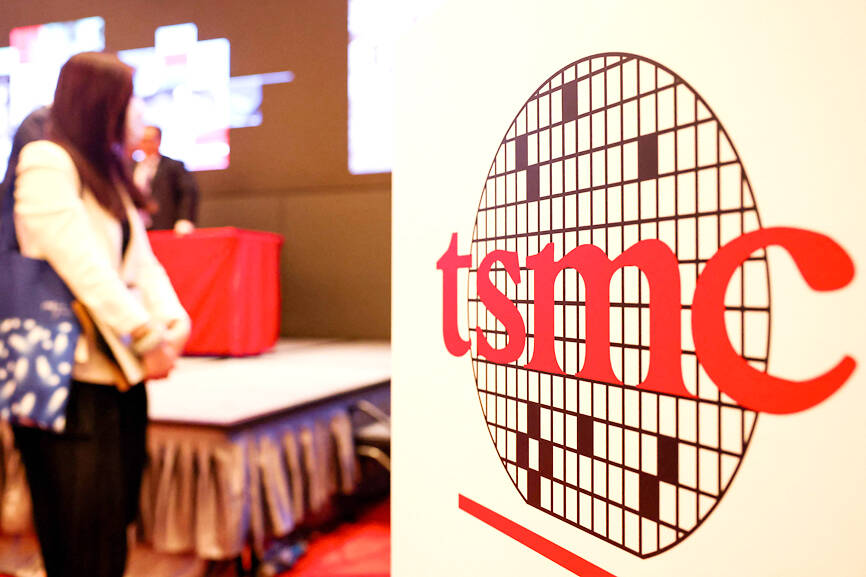Taiwan Semiconductor Manufacturing Co (TSMC, 台積電) reported a 26 percent growth spurt last month, adding to evidence of accelerating spending on artificial intelligence (AI).
The go-to chipmaker for AI hardware providers Nvidia Corp and Advanced Micro Devices Inc yesterday said that sales last month totaled NT$323.2 billion (US$10.83 billion). That growth is in line with analyst expectations of a 25 percent increase in the company’s third-quarter revenue.
Even with the headwind of a stronger New Taiwan dollar, TSMC is on a torrid pace of growth this year — up 38 percent over its performance from January to July last year — and it is working to close the gap between supply and elevated demand.

Photo by Cheng I-hwa / AFP
TSMC shares hit a record high on Thursday, following an announcement by the administration of US President Donald Trump of new tariffs on chips that would exempt TSMC due to its investment in US production.
TSMC and GlobalWafers Co (環球晶圓) are the most likely of Taiwan’s chipmakers to benefit from new tariffs on semiconductors after investing billions in production facilities in the US. Limited near-shoring efforts by United Microelectronics Corp (聯電) and ASE Technology Holding Co (日月光投控) leave them vulnerable and at risk of losing market share to US-based rivals GlobalFoundries Inc and Amkor Technology Inc.
Beyond its primacy as the top choice for AI silicon, TSMC still has significant business providing semiconductors for smartphones and that sector is on a gradual recovery this year, Sony Group Corp said after its earnings on Thursday.
Apple Inc also just reported its fastest quarterly revenue growth in more than three years on solid demand in China and said its sales in the current quarter would grow a mid-to-high-single-digit percentage year-on-year.

NEW IDENTITY: Known for its software, India has expanded into hardware, with its semiconductor industry growing from US$38bn in 2023 to US$45bn to US$50bn India on Saturday inaugurated its first semiconductor assembly and test facility, a milestone in the government’s push to reduce dependence on foreign chipmakers and stake a claim in a sector dominated by China. Indian Prime Minister Narendra Modi opened US firm Micron Technology Inc’s semiconductor assembly, test and packaging unit in his home state of Gujarat, hailing the “dawn of a new era” for India’s technology ambitions. “When young Indians look back in the future, they will see this decade as the turning point in our tech future,” Modi told the event, which was broadcast on his YouTube channel. The plant would convert

‘SEISMIC SHIFT’: The researcher forecast there would be about 1.1 billion mobile shipments this year, down from 1.26 billion the prior year and erasing years of gains The global smartphone market is expected to contract 12.9 percent this year due to the unprecedented memorychip shortage, marking “a crisis like no other,” researcher International Data Corp (IDC) said. The new forecast, a dramatic revision down from earlier estimates, gives the latest accounting of the ongoing memory crunch that is affecting every corner of the electronics industry. The demand for advanced memory to power artificial intelligence (AI) tasks has drained global supply until well into next year and jeopardizes the business model of many smartphone makers. IDC forecast about 1.1 billion mobile shipments this year, down from 1.26 billion the prior

People stand in a Pokemon store in Tokyo on Thursday. One of the world highest-grossing franchises is celebrated its 30th anniversary yesterday.

Zimbabwe’s ban on raw lithium exports is forcing Chinese miners to rethink their strategy, speeding up plans to process the metal locally instead of shipping it to China’s vast rechargeable battery industry. The country is Africa’s largest lithium producer and has one of the world’s largest reserves, according to the US Geological Survey (USGS). Zimbabwe already banned the export of lithium ore in 2022 and last year announced it would halt exports of lithium concentrates from January next year. However, on Wednesday it imposed the ban with immediate effect, leaving unclear what the lithium mining sector would do in the